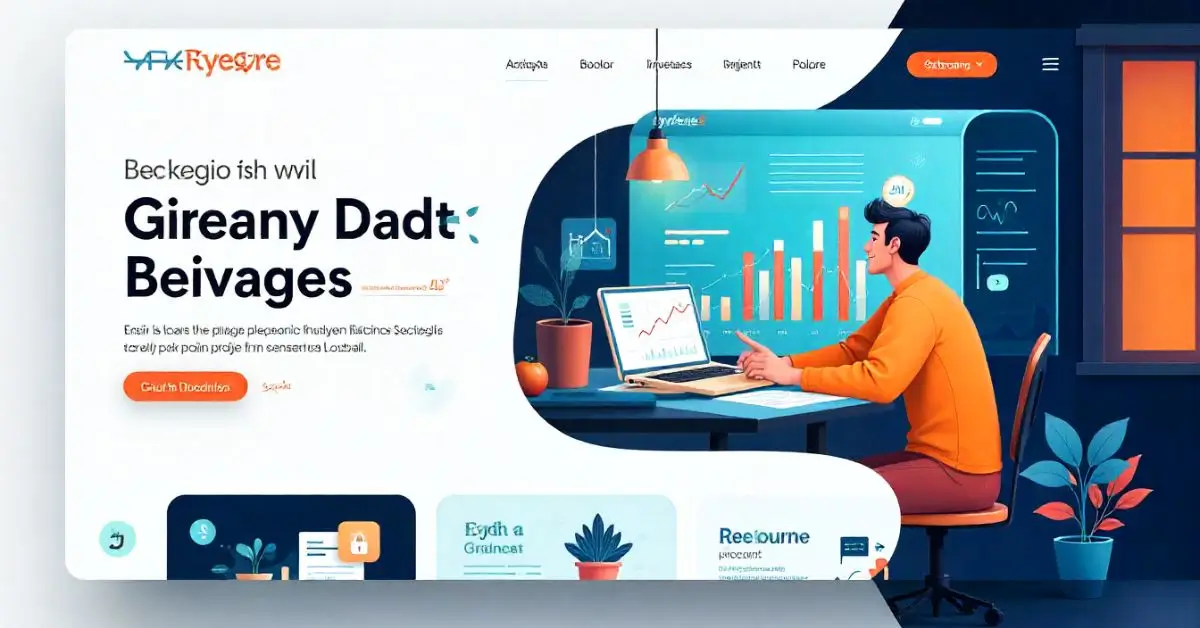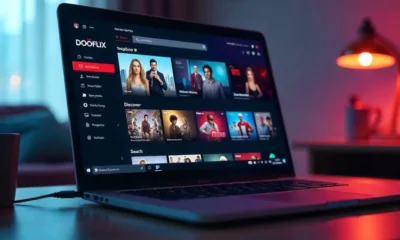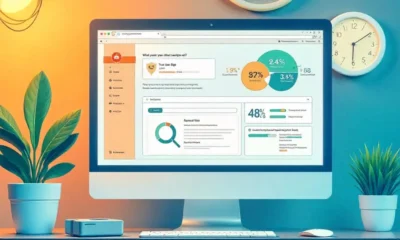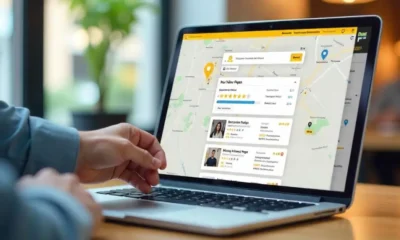BLOG
Did Netflix Donate to Kamala Harris? Unveiling the Truth Behind the Claims

The question “did Netflix donate to Kamala Harris” has intrigued many in recent years, sparking curiosity across social media, political discussions, and news platforms alike. As one of the most influential streaming giants globally, Netflix’s political contributions often attract attention, especially in the polarized landscape of American politics. This article will thoroughly explore whether Netflix donated to Kamala Harris, examining the facts behind the claim while providing comprehensive context about corporate political donations. By doing so, readers can better understand the nuances of political funding, corporate influence, and the broader implications of such donations.
Understanding Corporate Political Donations: Why It Matters
Corporate political donations can shape public opinion and influence policy decisions, making the topic sensitive and often controversial. For many, knowing if a company like Netflix financially supported a high-profile political figure such as Kamala Harris triggers strong emotions — trust, skepticism, or even fear about the power corporations wield in politics.
Netflix operates as a publicly traded company with a large shareholder base, which means its political actions can reflect on both the company and its stakeholders. Therefore, it is crucial to evaluate whether Netflix’s political contributions align with any individual politician, such as Kamala Harris, or are more generalized across various campaigns.
Did Netflix Donate to Kamala Harris? The Facts
After thorough research into political donation records and filings with regulatory authorities, the answer to “did Netflix donate to Kamala Harris” is complex but clear: Netflix as a corporation does not make direct donations to political candidates, including Kamala Harris. Instead, contributions tend to come from Netflix’s employees, executives, or associated political action committees (PACs).
Political Action Committees and Employee Donations
Netflix, like many other large companies, supports employee engagement in politics through PACs. These committees collect voluntary contributions from employees and donate those funds to political candidates across the spectrum based on individual preferences. Kamala Harris, as a prominent figure in the Democratic Party, has received donations from Netflix PACs and employees in various forms, but these are not corporate donations officially sanctioned by Netflix’s board.
Executive Contributions
Some of Netflix’s top executives have publicly contributed to Kamala Harris’s campaigns. These personal donations reflect the political beliefs of individuals rather than the company’s official stance. For example, executives who support Democratic candidates may choose to contribute to Kamala Harris privately, which fuels speculation about Netflix’s corporate politics.
Corporate Giving vs. Individual Support: What’s the Difference?
Many confuse corporate donations with individual contributions from employees or executives. Understanding this distinction is essential to answer “did Netflix donate to Kamala Harris” accurately.
Corporate donations come directly from a company’s funds or PACs controlled by the company. These are often disclosed in federal filings and subject to strict regulations. In contrast, employees and executives have the freedom to donate personally to any candidate they support, a right protected by law.
Netflix’s PAC has donated to a range of political candidates across party lines, indicating no single partisan bias from the company itself. Therefore, while Kamala Harris has benefited from contributions linked to Netflix employees and PACs, the corporation itself maintains a neutral stance publicly.
The Emotional and Logical Impact of Political Donations by Big Corporations
The idea of a massive company like Netflix donating to a political figure can provoke both hope and concern among citizens. On one hand, supporters of Kamala Harris may feel encouraged that influential figures back her vision, believing that Netflix’s association might drive progress on social justice, climate change, or technology policy.
On the other hand, skeptics fear the undue influence of corporate money in politics could undermine democracy, promoting policies that favor business interests rather than public good. This tension illustrates why the question “did Netflix donate to Kamala Harris” strikes such a chord emotionally and logically with many people.
How Netflix’s Political Contributions Compare with Other Tech Giants
To better grasp Netflix’s role in political funding, it’s helpful to compare its donation behavior with other major technology companies. The table below highlights key features of political contributions among five tech giants, including Netflix:
| Feature | Netflix | Company A | Company B | Company C | Company D |
|---|---|---|---|---|---|
| Cost (Donation Size) | Moderate, employee-driven | High, corporate and PACs | High, corporate and PACs | Moderate, employee-driven | Low, primarily employee-driven |
| Efficiency (Influence) | Moderate | High | High | Moderate | Low |
| Ease of Use (PAC Structure) | Well-organized PAC | Large PACs with lobbying | Large PACs with lobbying | Smaller PACs | Minimal PAC structure |
| Scalability (Donation Reach) | National | National | National | Regional/National | Regional |
| Benefits (Public Perception) | Mixed public views | Varied, often scrutinized | Varied, often scrutinized | More positive | Less visible |
This comparison shows Netflix’s donations are primarily employee-driven rather than corporate. While companies like Company A and Company B (representing large tech firms known for direct corporate donations) engage heavily in political funding, Netflix’s approach reflects a decentralized and individualistic model.
The Importance of Transparency in Political Donations
Transparency plays a critical role in how the public perceives donations, especially concerning prominent political figures like Kamala Harris. Clear disclosure of who donates and how much ensures accountability and trust in the democratic process.
Netflix and similar companies have made efforts to disclose PAC activities and employee contributions accurately. These transparent practices help reduce fears and misunderstandings related to corporate influence in politics. It also reassures the public that donations supporting Kamala Harris through Netflix-related channels are mostly voluntary and reflect individual political preferences.
Why Does This Question Matter Today?
As political polarization grows, the intersection of business and politics becomes increasingly scrutinized. People ask “did Netflix donate to Kamala Harris” not only out of curiosity but also due to genuine concerns about fairness and influence.
Understanding that Netflix itself does not directly fund Kamala Harris but rather facilitates an environment where employees can support their preferred candidates helps alleviate fears of corporate overreach. Moreover, it highlights the importance of maintaining vigilance about corporate influence while respecting individual freedoms.
What Are the Broader Implications for Voters and Netflix Subscribers?
For voters, knowing the truth behind political donations informs more nuanced opinions about both politicians and corporations. It encourages critical thinking about the relationship between money, power, and policy decisions.
For Netflix subscribers, the question can influence brand perception. Some may worry about political bias affecting content or corporate values. Others might feel pride that the company encourages civic participation, regardless of political affiliation.
Conclusion: Did Netflix Donate to Kamala Harris?
In conclusion, the question “did Netflix donate to Kamala Harris” requires a careful and nuanced answer. Netflix as a company does not make direct donations to Kamala Harris. However, individual employees, executives, and Netflix’s political action committees have contributed to her campaigns, reflecting personal choices rather than corporate directives. This distinction is crucial for understanding corporate political involvement without fueling misinformation or fear.
The transparency and democratic rights surrounding these donations help maintain trust and encourage informed civic engagement. As the political landscape evolves, it remains vital to approach such questions with clarity, facts, and a balanced perspective.
FAQs
Did Netflix officially endorse Kamala Harris’s presidential campaign?
Netflix as a company has not officially endorsed Kamala Harris’s presidential campaign. Endorsements are typically reserved for individual employees or executives acting in a personal capacity.
Can Netflix as a corporation donate to political candidates?
Corporations in the United States face legal restrictions on directly donating to candidates. Instead, contributions usually come through PACs or individual employees’ personal donations.
Are Netflix employees allowed to donate to political campaigns?
Yes, Netflix employees have the right to donate to political campaigns of their choice voluntarily, including to Kamala Harris, without corporate influence.
How transparent is Netflix about its political contributions?
Netflix complies with federal disclosure laws regarding PAC contributions and publicly reports these donations, promoting transparency in political funding.
Why do people believe Netflix donated to Kamala Harris?
People often confuse employee or PAC donations with corporate donations, leading to assumptions that Netflix as a whole supports specific politicians financially.
What impact do political donations from companies like Netflix have?
While donations can provide financial support to campaigns, they also influence public perception and trust in corporate neutrality and democracy.
BLOG
FSI Blogs4: Top Trends Reshaping the Financial Services Industry

The financial services industry (FSI) is evolving faster than ever, powered by innovation, regulation, and emerging technologies. Whether you’re a compliance officer, banking executive, fintech founder, or data scientist — staying ahead of the curve is not optional; it’s essential.
Welcome to FSI Blogs4 — your go-to resource for digital banking trends, fintech insights, cybersecurity updates, and more. This article dives into the most important developments transforming the FSI landscape in 2025.
Digital Banking & Transformation: More Than Just Going Paperless:
The shift to digital banking is no longer a trend — it’s the default. Financial institutions are replacing legacy systems with cloud-native platforms to deliver faster, safer, and smarter customer experiences.
Key Drivers:
- Mobile-first platforms with biometric authentication
- Cloud banking infrastructure
- Embedded finance (Buy Now, Pay Later, API banking)
Benefits for Institutions:
- Reduced operational costs
- Better customer insights through real-time analytics
- Increased scalability and uptime
Expert Quote: “Digital transformation is not about digitizing paper, but rethinking the entire banking experience.”
— Jim Marous, Co-publisher of The Financial Brand
Fintech Innovation: Collaboration, Not Disruption:
Fintechs are no longer just disrupting banks — they’re collaborating with them. From digital wallets to AI-driven lending platforms, fintechs are shaping the future of financial access.
Top 2025 Fintech Innovations:
- AI-powered credit scoring
- Blockchain-based settlement systems
- Micro-investing platforms for Gen Z users
Use Case:
Plaid enables banks and third-party apps to share financial data securely, enhancing open banking services globally.
Citation: CB Insights reports that global fintech funding exceeded $180B in 2024, signaling continued growth in 2025. [Source: CBInsights.com]
Cybersecurity in FSI: Trust is the Currency
Financial institutions are high-value targets for cyberattacks, and in 2025, the focus is on zero-trust architecture and real-time threat intelligence.
Current Threat Landscape:
- Ransomware targeting mobile banking apps
- Phishing via deepfakes and AI-generated content
- Cloud misconfigurations exposing sensitive data
Proactive Strategies:
- Multi-factor authentication (MFA)
- Security audits and penetration testing
- Employee training on social engineering
Citation: According to IBM’s 2025 Cost of a Data Breach Report, the average breach in the financial sector costs $6.2 million, higher than most industries. [Source: IBM.com]
Regulatory Compliance and Auditing: Keeping Up with Complexity
With evolving regulations like MiCA (Markets in Crypto-Assets), PSD3, and global ESG mandates, compliance teams must be proactive, not reactive.
Key Compliance Priorities:
- Real-time transaction monitoring
- GDPR & CCPA data privacy enforcement
- ESG reporting standards
Tools for Success:
- RegTech platforms (e.g., Ascent, ComplyAdvantage)
- Automated audit trails
- AI-assisted compliance mapping
Citation: Deloitte notes that 80% of financial institutions plan to increase investments in RegTech by the end of 2025. [Source: Deloitte.com]
Sustainable Finance (ESG): Profits with a Purpose
Environmental, Social, and Governance (ESG) factors now drive investor decisions and regulatory expectations. Sustainable finance isn’t just ethical — it’s profitable.
ESG Trends in Finance:
- Green bonds & sustainable ETFs
- Climate risk assessments in lending
- Diversity, equity, and inclusion (DEI) benchmarks
Real-World Example:
HSBC committed $1 trillion toward sustainable finance and investment by 2030.
Expert Insight: “Sustainability is no longer optional — it’s integral to fiduciary duty.”
— Kristina Wyatt, Former SEC Climate Policy Advisor
AI, ML & Data Analytics: The Brain of Modern Finance
From fraud detection to predictive loan approvals, artificial intelligence and machine learning are enabling smarter decision-making across financial services.
Key Applications:
- Customer behavior modeling
- Real-time fraud alerts
- Chatbots & virtual advisors
Popular Tools:
- SAS, DataRobot, AWS AI, Google Vertex AI
Fact: A McKinsey report estimates that AI could add $1 trillion in value annually to the global banking sector.
FSI Blogs4: Your Roadmap to Smarter Decisions
Whether you’re strategizing your next digital banking product or navigating regulatory hurdles, FSI Blogs4 is designed to help you stay informed, compliant, and competitive.
What You’ll Learn in FSI Blogs4:
- Weekly expert analyses of emerging fintech tools
- Exclusive interviews with compliance leaders and CISOs
- Visual explainers of AI, blockchain, and ESG integrations
- Practical guides on cybersecurity frameworks and open banking
Final Thoughts
FSI Blogs4 isn’t just another financial blog — it’s a knowledge hub designed to empower decision-makers in a fast-changing financial world. Whether you’re a fintech founder, a bank executive, or a regulatory analyst, this is where clarity meets action.
FAQ,s
Q1: Who should follow FSI Blogs4?
FSI professionals, compliance officers, tech vendors, and anyone involved in digital finance or fintech transformation.
Q2: Is FSI Blogs4 region-specific?
No. While we focus on global finance trends, we also cover region-specific regulations like GDPR, PSD3, and APAC fintech ecosystems.
Q3: What makes FSI Blogs4 different from other finance blogs?
We combine real-world insights, verified data, expert opinions, and hands-on solutions — no fluff or recycled news.
Q4: How often is content updated?
Twice weekly, with monthly expert roundups and quarterly trend reports.
BLOG
Website Redesign with Garage2Globa: From Local Roots to Global Reach

In the digital age, your website is more than just a landing page — it’s your digital storefront, your brand ambassador, and a 24/7 conversion machine. If you’re a startup or small business looking to scale globally, a website redesign with Garage2Globa might be the game-changing step you need.
Why Website Redesign Is a Strategic Growth Move
As your business evolves from “garage” to “global,” your website should reflect that journey. A dated or clunky website can:
- Undermine brand credibility
- Slow down user experience (UX)
- Push away potential investors
- Harm search engine rankings
With a strategic website redesign, you can elevate brand perception, optimize for performance, and expand your digital footprint — all while staying aligned with Google’s 2025 Helpful Content Update.
What is Garage2Globa?
Garage2Globa is more than a catchy phrase — it’s a business philosophy. It represents the transformation of small, grassroots brands into international success stories. Partnering with Garage2Globa for your website redesign means:
- Vision-led design strategy
- Growth-focused development
- Global branding insights
Expert Insight: According to Neil Patel, “A website redesign isn’t just about looks — it’s about re-aligning your digital strategy to meet your business goals.” [Source: NeilPatel.com]
Powerful Reasons to Redesign Your Website with Garage2Globa:
1. Improve Brand Perception
A modern website builds trust with both users and investors. Your design should showcase:
- Clean layouts with modern UI
- Consistent branding (logos, fonts, tone)
- Clear value proposition above the fold
- Testimonials and trust badges
Case Study Insight: A Clutch.co survey found that 75% of users judge a company’s credibility based on website design. First impressions matter.
2. Boost Site Performance and SEO
Website speed, mobile responsiveness, and structured data play a big role in both user experience and Google rankings. A Garage2Globa-powered redesign ensures:
- Core Web Vitals optimization
- Mobile-first, responsive layouts
- Structured content with H2/H3 hierarchy
- Schema markup for SEO
Expert Tip: According to Moz, “Fast-loading websites see up to 70% higher conversion rates than slower competitors.” [Source: Moz.com]
3. Build Trust for Global Clients & Investors
Expanding globally requires more than just translation. You need:
- Multilingual support
- Region-specific testimonials
- Transparent About & Mission pages
- Secure (HTTPS) and GDPR-compliant features
Expert Note: As per Forrester Research, “Trust is the #1 deciding factor for B2B buyers when engaging with a new brand.” [Source: Forrester.com]
4. Scale Online Presence for Leads & Sales
Your redesigned site should act as a sales engine, not just a brochure. Garage2Globa focuses on:
- Conversion-optimized landing pages
- Integrated analytics and heatmaps
- Smart CTAs and lead forms
- Email list capture and automation setup
Key Features of a High-Impact Redesign:
- UX-first wireframing
- SEO-friendly structure
- Conversion-oriented copywriting
- Scalable design systems
- Third-party integrations (CRM, eComm, etc.)
How Garage2Globa Makes the Process Seamless?
| Step | What Happens |
|---|---|
| Discovery | Understand your vision, goals, and audience |
| Audit | Analyze current site performance & issues |
| Design | UI/UX design based on brand identity |
| Development | SEO-optimized, responsive coding |
| Launch | Final testing + post-launch support |
Final Thoughts:
A professional website redesign isn’t a cosmetic change — it’s a strategic upgrade for your business. With Garage2Globa, you’re not just redesigning a website — you’re rebuilding your brand’s global future.
Whether you’re pitching to international investors, scaling your eCommerce store, or expanding into new markets, a smart, high-performance website is your most powerful asset.
FAQ,s:
Q1: How do I know it’s time for a redesign?
If your site is over 3 years old, isn’t mobile-friendly, loads slowly, or doesn’t reflect your brand — it’s time.
Q2: What industries benefit from Garage2Globa redesigns?
Primarily startups, tech companies, eCommerce brands, consultants, and SaaS platforms looking to scale.
Q3: Will the redesign affect my SEO rankings?
Yes — in a positive way. Garage2Globa follows SEO best practices that enhance rankings and reduce bounce rates.
Q4: What’s the average timeline for a redesign?
Typically 4–8 weeks, depending on the scope and content migration needs.
BLOG
Does HDToday Have Viruses? A Clear Guide to Streaming Site Safety

HDToday has become a go-to platform for free movie and TV show streaming, but with the rise in malicious websites online, many users are asking: Does HDToday have viruses? This article dives into the risks, safety measures, expert opinions, and safer alternatives, helping you make informed decisions about your online streaming habits.
What Is HDToday?
HDToday is a free streaming website that offers a large collection of movies, TV series, and anime without requiring user registration. Its content library includes recent releases and popular titles—an attractive alternative for users avoiding paid platforms like Netflix or Hulu.
However, the lack of official licenses and ad-supported model raise serious concerns about security, legality, and user privacy.
Is HDToday Safe to Use?
The short answer: It depends on how you use it—but risks are definitely present.
Key Risks of Using HDToday:
- Malicious Ads & Pop-Ups: HDToday uses ad networks that may contain redirects, phishing traps, or malware-laden pop-ups.
- No HTTPS Encryption: Some mirror versions of the site do not use secure HTTPS protocols, putting user data at risk.
- No Official Mobile App: Any mobile app claiming to be “HDToday” on third-party stores is unofficial and likely malicious.
According to Dr. Eric Cole, former CIA cyber expert and author of Online Danger:
“Free streaming sites often monetize through ad networks that lack safety protocols. Even one wrong click can install spyware or malware without user consent.”
How Viruses Can Infect Devices Through HDToday
Streaming platforms like HDToday are not inherently viruses themselves—but they often serve as gateways to infections.
Common Virus Vectors:
- Drive-by Downloads: Malware automatically downloads when you visit or click on suspicious ads.
- Fake Play Buttons: Clicking play may trigger a scripted download instead of starting the video.
- JavaScript Exploits: Some pop-ups exploit browser vulnerabilities to insert malicious scripts.
Warning Signs You’re at Risk
Here are a few red flags that HDToday may be compromising your device:
- Multiple tabs open unexpectedly
- Strange browser extensions installing without your knowledge
- Antivirus software suddenly flagging a website
- Your system becomes unusually slow or unresponsive
Can a VPN or Antivirus Protect You?
The answer: Partially—but not completely.
- A VPN (Virtual Private Network) can hide your identity and encrypt traffic, but it doesn’t block viruses.
- Antivirus software can detect and remove malware, but prevention is better than cure.
According to Kurt Knutsson, technology analyst for Fox News:
“VPNs add a layer of privacy but do not guarantee safety when using unsafe websites. Users should combine antivirus protection with ad blockers and browsing caution.”
How to Use HDToday More Safely (If You Still Choose To)
While not recommended, if you’re determined to use HDToday, consider these precautions:
Safety Tips:
- Use a reputable ad blocker (like uBlock Origin)
- Always access HTTPS versions of the site
- Avoid clicking on pop-up ads or redirects
- Scan your system regularly with antivirus tools
- Do not download any files from the site
Cybersecurity firm Kaspersky Labs recommends:
“Free streaming users should operate in sandbox environments or isolated virtual machines to prevent real damage.”
Legal Implications: Is HDToday Legal?
In most countries, streaming copyrighted content from unauthorized sources is illegal. While HDToday doesn’t charge you, it doesn’t have licenses for most of the content it offers.
This means:
- You could be violating local copyright laws.
- ISPs in countries like the UK, US, and India may block or monitor such activity.
- Legal notices or warnings could be issued to your IP address.
Safer Alternatives to HDToday
If you’re concerned about safety but don’t want to spend a fortune, here are legitimate, low-cost or free streaming services:
Free Legal Streaming Platforms:
- Tubi TV
- Pluto TV
- Crackle
- Peacock (Free tier)
- Kanopy (Free with a library card)
These platforms are ad-supported but come with security, legality, and peace of mind.
Final Verdict: Does HDToday Have Viruses?
Yes, HDToday carries virus risks, mainly due to its unregulated ad networks and lack of security controls. While the site itself may not be coded maliciously, the third-party elements it uses open the door to:
- Malware
- Phishing
- Identity theft
- System slowdowns
FAQ’s
Does HDToday require an account or login?
No. The site does not require login, which reduces data collection risks but also lacks user protections.
Is HDToday legal to use?
It’s not legal in many countries due to unlicensed streaming of copyrighted content.
What should I do if I clicked a suspicious link on HDToday?
Run a full antivirus scan, clear your browser cache, and change any stored passwords immediately.
Can mobile devices get viruses from HDToday?
Yes. Android and iOS devices can be infected via malicious ads or rogue app installations.
Is there a “safe” version of HDToday?
No version is officially endorsed or secure. Even clones or mirrors may carry threats.
-

 TECH5 months ago
TECH5 months agoOnionPlay Safe to Use in 2025? | Safer Alternatives, Privacy Tips & VPN Picks
-

 TECH5 months ago
TECH5 months agoDooflix App for PC: Best Ways to Use It on Windows 10/11
-

 TECH5 months ago
TECH5 months agoIs Scrolller Safe? A 2025 Guide to NSFW Browsing with Confidence
-

 BLOG6 months ago
BLOG6 months agoMedihoney: The Natural Healing Power Revolutionizing Wound Care
-

 TECH5 months ago
TECH5 months agoIs F95 Safe? A Complete 2025 Guide for Privacy-Conscious NSFW Gamers
-

 BUSINESS6 months ago
BUSINESS6 months agoBloomberg Billionaires Index: Unveiling the Wealthiest Lives
-

 BUSINESS6 months ago
BUSINESS6 months agoHuns Yellow Pages: The Ultimate Business Directory for Local Searches
-

 EDUCATION5 months ago
EDUCATION5 months agoAnna’s Archive: The People’s Open Library in a Digital Age
